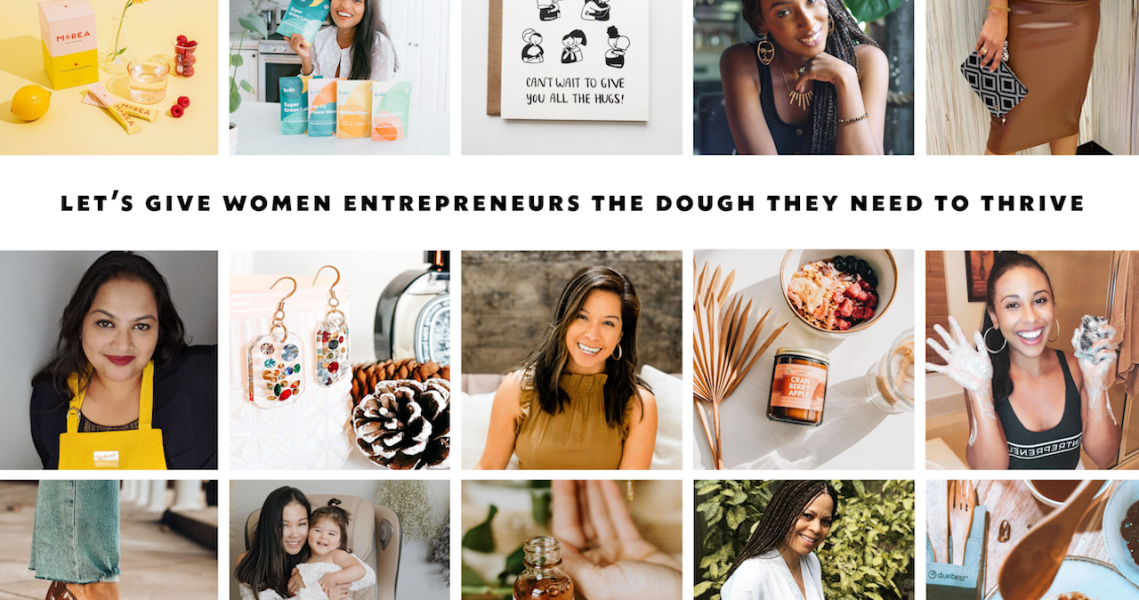As companies aim to become more purpose-driven to satisfy the conscious consumer, e-commerce platform Dough is committed to deepening the pockets and heightening the profiles of emerging female-owned beauty brands.
Co-founded by CEO Vanessa Bruce and board member Anna Palmer in 2018, Dough started as a subscription service that featured a curated directory of female-owned businesses. But the model began to evolve to a membership and marketplace model, after Bruce and Palmer raised a $1.4 million seed round in 2019 led by Flybridge Capital and Able Partners.
“We started to build a robust storytelling platform about the brand founders, the products they sell and the values behind them, whether they be cruelty-free, eco-friendly or give-backs. I like to say there are ‘three Cs’ to shopping: convenience, cost and credibility,” said Bruce.
Dough’s marketplace launched in September 2020. Fifteen product categories are featured alongside beauty, including accessories and apparel. Beauty is the third most-popular category, based on sales, after home-and-office and food-and-beverage. And to date, nearly a quarter of orders placed on Dough contain a beauty product. Bruce said that, on average, sales are increasing month-over-month by 75%, with site traffic growing by 260% from September 2020 through holiday. Nearly 50 beauty brands now actively sell on Dough, and an average of 5-10 new brands are on-boarded every month.
“Dough is very tuned into the brands they carry and go out of their way to tell the founder stories. It’s important, because our customers want to know who is behind the brand and what [our] values are,” said Lynn Power, CEO and co-founder of botanical hair-care brand Masami, which also launched in 2020. Dough sales currently make up a “very small” part of the brand’s revenue. “At this point, it’s really about driving awareness. Our hope is to grow as they grow,” said Power. Masami is also sold on Amazon, The Verticale and Verishop.
The majority of Dough’s sales come from email marketing efforts and their affiliate program. Shoppers can choose to direct their affiliate earnings (10% of retail sales and $15 for each VIP membership activated) toward the Wallet Power Fund, which Dough operates in partnership with other women-first organizations like Ellevest and Built by Girls. The fund also offers $500 grants to small female-owned businesses that make less than $250,000 in revenue and sell on the marketplace. The first round of grant recipients will be announced in the next few weeks, said Bruce. Other marketing channels include micro-influencer outreach on Instagram through the USG platform Minisocial and brand-sponsored pop-ups.
Customers can become a VIP member, which Bruce describes as “Amazon Prime for women-owned” brands: Members get free shipping and 20% discounts on orders. Membership pricing ranges from $39-$59 a year, with 25% of VIP profits donated to the Imani Collective in Kenya. Dough takes a 25% commission on all retail orders sold through the marketplace and a 5% commission on all VIP orders. Customers can shop the retail price directly on Dough, as well — products are priced the same as on a brand’s DTC site, plus customers pay for shipping. Bruce said the majority of Dough customers are city-dwelling women ages 25-34, who are passionate about women’s empowerment and shopping with impact.
“We built the marketplace on top of our [directory] model to make it easier for our VIP’s to shop and use their benefits,” said Bruce. VIP memberships grew 300% after the marketplace launch in last September. It continues to grow month-over-month, she said.
In addition to selling female-owned brands, Dough is committed to being a discovery and storytelling platform. Customers can dig deep into brand founders’ stories and learn about their values under the “Meet” tab on the landing page. Beyond the standard category and price filters, a customer can also search by a brand’s “Impact” (with “inclusive” and “vegan” among options) or “Community” (choosing from “woman of color” and “LGBTQIA+,” to name examples). Brands can list for free in the Collective to boost awareness, but they must offer a discount to VIP members to shop their own DTC site. The discount is determined by the brand.
Dough has made a point to address women’s pay on the site, and in a frank matter. The company’s internal pay structure can easily be accessed by anyone who scrolls through the “About” tab on the platform’s landing page, and all Dough employees know what their colleagues take home in salary. “We are living our values now. We’re not just threading them into the revenue-generating areas of our business, but we’re threading them into our company culture, in general,” Bruce said. “We believe in the financial independence of women. That is down to the core of what Dough is.”
Applications to sell on the platform have increased by 600% across all categories since September 2020, according to Bruce. Most interested brands are operated by solo founders and consist of small teams engaged in small-batch productions of skin care, body care, hair care or makeup.
Two-year-old skin-care brand Becalia Botanicals, founded and operated by CEO Jazmin Guerrero, is one of the platform’s top sellers. Dough accounted for nearly 25% of the brand’s total business in December.
“They’re constantly featuring different vendors and curating different lists for their members to look at, which is helps to highlight both our products and stories,” said Guerrero. “They advocate for their brands, including to customers and larger brands, via facilitating partnerships.”
Dating app Bumble is just one of those larger partners. Often referred to as Tinder for feminists, Bumble partnered with Dough in December to curate self-care kits for frontline workers. Becalia sold 2,500 units through the order, a boon to the young brand. Bruce said the Bumble partnership brought in almost $50,000 of sales to Dough and participating brands.




